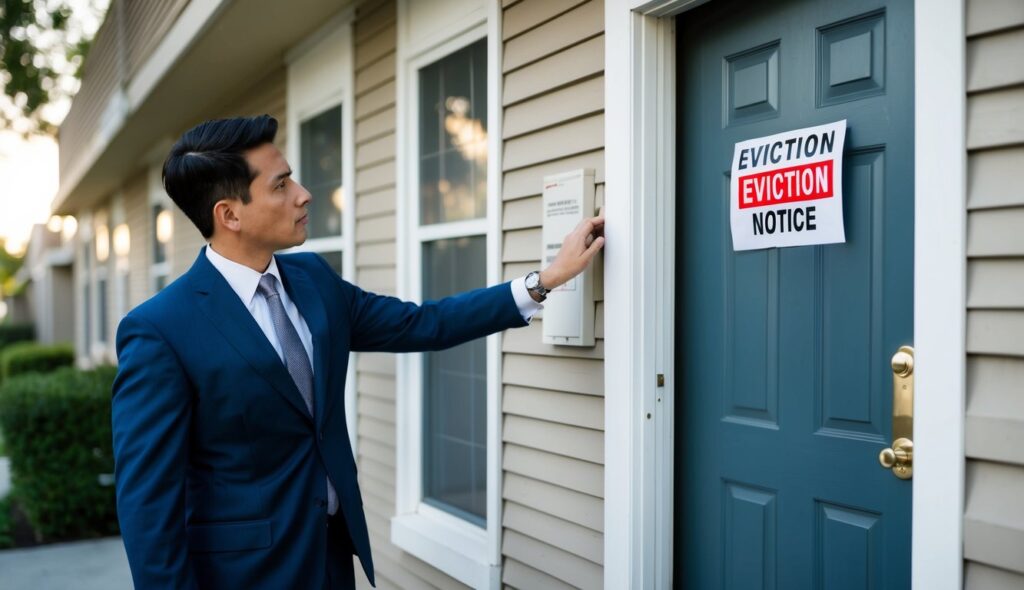
Eviction in Multifamily Housing: Understanding Tenant Rights and Management Responsibilities
Eviction in multifamily housing is a serious topic that affects both landlords and tenants. Understanding the eviction process is crucial for maintaining a healthy landlord-tenant relationship.
For tenants, knowing your rights can empower you to take informed steps if you face eviction. Resources are available to help you navigate this challenging situation effectively. For landlords, it’s important to establish fair practices that support a balanced approach to managing multifamily properties.
Key Takeaways
- Understanding eviction is key to a healthy landlord-tenant relationship.
- Knowing your rights can help you handle eviction issues.
- Fair practices are essential for effective property management.
Understanding Eviction in Multifamily Housing
Eviction in multifamily housing involves removing a tenant for not following lease terms. It’s essential to know the legal steps, housing policies, and prevention strategies to handle this effectively.
The Eviction Process
The eviction process starts with a landlord giving formal notice to the tenant, detailing lease violations like unpaid rent or property damage. Tenants usually have a certain period to fix these issues or move out.
If the tenant doesn’t comply, the landlord may file an eviction lawsuit. During legal proceedings, a judge decides if eviction is justified. Proper documentation of violations is crucial to support the landlord’s case.
Eviction filings must align with local housing policies. Adhering to these rules helps ensure a legal and smooth process. Court judgments typically grant the landlord the right to reclaim the property if they win the case.
Eviction Mitigation Principles
Eviction mitigation aims to prevent eviction through planning and support for tenants. It focuses on collaboration between landlords and tenants. Strategies include payment plans or rent reductions during difficult times.
In times of financial hardship, programs like emergency housing assistance or mediation services can be helpful. These resources offer financial aid or negotiate solutions to keep tenants in their homes.
Some organizations emphasize community partnerships to reduce eviction rates. These initiatives work with local governments and nonprofits to address housing stability. By staying informed and proactive, you can help make eviction a last resort option.
Tenants’ Rights and Resources
As a tenant, you have access to various rights and resources designed to support you in multifamily housing. These include financial assistance programs and community resources that can help you navigate issues related to housing stability and fair housing practices.
Rental Assistance Benefits
Rental assistance benefits are crucial for many tenants, especially low-income renters. Programs like Section 8 vouchers, administered by public housing authorities, help cover a portion of your rent. These vouchers are often used in affordable housing units, making it easier for you to manage housing costs.
In addition, USDA Rural Development and the U.S. Department of Housing and Urban Development (HUD) offer rental assistance programs. These programs may provide financial support or resources to help you avoid eviction. If your income changes, you might qualify for a rent recalculation with USDA assistance. Understanding your eligibility and how to apply is key to benefiting from these supports.
Community and Legal Resources
Community resources can be invaluable when facing housing challenges. Local organizations often provide support by offering legal advice, housing counseling, and mediation services. These resources can guide you through the grievance process, ensuring you know your rights in case of disputes with landlords.
Moreover, fair housing organizations support tenants by addressing discrimination claims and educating renters about their rights. They can help you access resources provided by HUD to ensure your housing is fair and equitable. Whether you need legal guidance or community support, knowing where to seek help can make a significant difference in maintaining your housing stability.
Best Practices for Landlords and Housing Providers
Creating stable and productive relationships with tenants is crucial to maintaining successful multifamily housing. Adapting practices like flexible lease terms and engaging proactively with tenants can make a significant difference in housing stability and reduce risks of eviction.
Flexible Lease Terms and Payment Plans
Offering flexible lease periods can be a game-changer. This flexibility allows tenants to rent for durations that better fit their changing circumstances. Giving short-term or month-to-month options instead of fixed-year contracts can help address housing instability.
Payment plans are another vital tool, allowing rent deferments or spreading payments over time. This approach can prevent financial strain on tenants, reducing the risk of eviction and homelessness. By adopting these practices, you encourage a secure environment for tenants while maintaining consistent income.
Proactive Engagement with Tenants
Engagement with tenants should be proactive, not reactive. Building strong communication channels helps address issues early, preventing them from escalating. Reach out regularly to check in with tenants about their needs or potential concerns.
Regular workshops or information sessions can be valuable, educating tenants on financial planning or community resources available. Collaboration with organizations like the National Multifamily Housing Council or local housing providers can offer additional support to tenants, enhancing overall housing stability. By taking these steps, you foster trust and ensure better outcomes for both landlords and tenants.
Frequently Asked Questions
When dealing with eviction in multifamily housing, it’s important to understand the legal process, notice periods, and the effects of eviction moratoriums. Each location has specific requirements for landlords and tenants.
What is the legal process for eviction in Florida?
In Florida, the eviction process begins with the landlord serving the tenant a written notice, which varies based on the reason for eviction.
If the tenant does not comply within the notice period, the landlord can file an eviction lawsuit (known as an “unlawful detainer”) with the local county court.
The tenant is then served with a copy of the complaint and given a chance to respond. If the court rules in favor of the landlord, a writ of possession is issued to lawfully remove the tenant.
How long does the eviction process typically take in Florida?
The timeline for eviction in Florida can vary but typically ranges from a few weeks to a couple of months.
Factors affecting the timeline include the reason for eviction, court schedules, and whether the tenant contests the eviction. Delays may occur if the process is not followed precisely or if legal disputes arise.
What constitutes legal grounds for eviction in multifamily housing?
Legal grounds for eviction include non-payment of rent, lease violations, and illegal activities on the property.
Landlords must provide evidence to support these claims. Each jurisdiction may have slightly different qualifications for what constitutes legal grounds.
What notice period is required before an eviction can proceed in Florida?
The required notice period in Florida depends on the reason for eviction. For example, tenants must receive a 3-day written notice for non-payment of rent.
For lease violations, a 7-day notice to cure or vacate is required. In cases of termination without cause, month-to-month tenants must typically receive a 15-day notice.
All notices must comply with Florida law to be enforceable.
Are there any protections in place for tenants facing eviction in Florida?
While Florida law generally favors landlords in eviction cases, tenants have rights and can challenge an eviction if they believe it is unlawful.
Protections may also apply during emergencies or under specific government programs.
Tenants should seek legal advice if they believe their rights have been violated.
What steps must landlords take to lawfully evict a tenant in Florida?
Landlords in Florida must follow a specific legal process to evict a tenant. This includes:
- Providing the tenant with the appropriate written notice.
- Filing an eviction lawsuit with the court if the tenant does not comply with the notice.
- Serving the tenant with a copy of the lawsuit and waiting for their response.
- Attending a court hearing if the tenant contests the eviction.
- Obtaining a writ of possession from the court and working with law enforcement to remove the tenant if the court rules in favor of the landlord.
Let Kanga Property Management Handle Your Multifamily Housing Rentals
Choosing Kanga Property Management for your multifamily housing rentals can make your life much easier. Our experts handle everything, from rent collection to tenant communication, so you can focus on other responsibilities.
Why Kanga Property Management?
- Expertise: Our team knows the ins and outs of managing multifamily housing properties.
- Efficient Systems: With systems for rent collection, we ensure timely payments.
- Competitive Pricing: Our fees are designed to meet all your needs without hidden costs.
Stress-Free Eviction Handling
Evictions can be tough, but you don’t have to face them alone. Our professionals manage the eviction process swiftly, which means less stress for you. With our detailed tenant screening methods, problems can often be avoided, but we’re prepared to handle situations that do arise.
Benefits
- More Time: With Kanga managing your properties, you have more time to invest in other projects.
- Peace of Mind: Let trained professionals deal with challenges, knowing your properties are in good hands.
Rely on Kanga Property Management to take care of your multifamily rental properties. Our comprehensive services ensure that your properties run smoothly while you enjoy the freedom from day-to-day management tasks.


